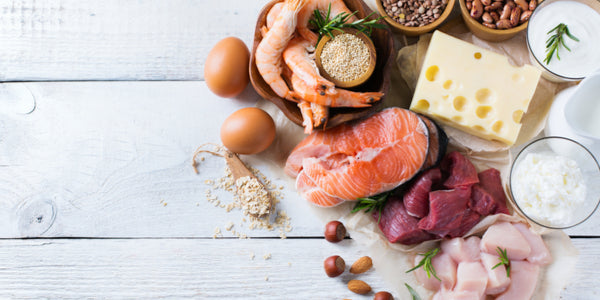
If wondering how to gain muscle and lose fat, protein is key with the complement of resistant training. Because, truly, protein is important for weight loss.
Protein also has other vital roles in the body, including functioning as antibodies, enzymes, and transporters. The macronutrient offers structure to cells of all kinds, too.
But what are good sources of protein? Here are 22 of them to help you lose weight and feel great!
List of Lean Protein Sources
From chicken to quinoa, including these lean proteins in a balanced diet can help maintain muscle while supporting weight loss and overall health.
1. Chicken
17 grams of protein per 3 ounces
When comparing the difference between white versus dark meat chicken, white is a superior lean protein source. But as dark meats contain more grams of fat and cholesterol, they tend to offer more nutrients compared to white meat.
Ultimately, control calorie and fat content by ditching the oils and fryer, as well as peeling off the skin.
2. Grassfed Beef
17 grams per 3 ounces
Red meat often gets a bad reputation based on growing research regarding cancer risks. However, there are numerous health benefits of eating red meat thanks to its high amount of protein and iron.
More specific to grass-fed beef, it is leaner and lower in fat and calories compared to grain-fed beef. Additionally, grass-fed beef is richer in omega-3 fatty acids, a type of "good" fat beneficial for heart and brain health.
But when selecting any sort of beef, choose "lean," "extra lean," and any sort of "loin" such as tenderloin and sirloin. This helps reduce overall calorie and fat content.
3. Ground Turkey
18 grams per 3 ounces
Ground turkey is a common lean protein meat alternative to ground beef. It can be used in various preparation methods, including added to chilis, soups, and tacos.
But really, all turkey is considered lean and nutritious. Just be cautious of packaged lunch meats often loaded with sodium and other undesirable preservatives.
4. Pork Tenderloin
26 grams per 3 ounces
While pork may not be as lean as other proteins, the National Pork Board claims "Today's pork has 16 percent less fat and 27 percent less saturated fat as compared to 1991."
Beyond its protein content, "the other white meat" is nutrient-dense with thiamin, niacin, riboflavin, vitamin B-6, phosphorus, zinc, and potassium.
However, it is important to beware and moderate the intake of cured variations of pork. These include bacon and ham that often contain nitrate and nitrite preservatives linked to cancer.

5. Bison
21 grams per 3 ounces
Recognized as buffalo meat, bison is measured as an exceptionally lean protein food. (So lean that it cooks quickly and becomes tough if cooked too long or at too high of a temperature!)
Buffalo is also traditionally raised on ranches and farms, making it respected grass-fed meat.
6. Venison
19 grams per 3 ounces
Often coming from deer, venison is a high-protein, low-fat food to explore and add to the meat repertoire.
Venison may even have more vitamins and minerals than beef supplies, including iron, vitamin B6, niacin, and riboflavin.
7. Jerky
13 grams per 1 ounce
Filled with protein, iron and zinc, beef jerky is a power-packed lean meat snack to keep on hand.
Though the protein content is variable, plant-based jerkies are increasing in popularity. They are especially fitting for those limiting animal meats or following a vegetarian or vegan lifestyle.
8. Eggs
6 grams per 1 medium egg
Eggs are suggested to be the best, high-quality protein you can buy. The yolks are one of the very few food sources naturally supplying vitamin D, too.
They are also a valuable source of choline, the antioxidants lutein and zeaxanthin, selenium, phosphorus, and some B vitamins.
9. Canned Tuna
20 grams per 3 ounces
Canned tuna is a budget-friendly protein source, along with being naturally rich in heart-healthy omega-3 fatty acids.
When selecting tuna, select a product soaking in water rather than oil and salt. Eat straight from the can, in a salad, or paired with veggies or whole grain crackers.
10. Salmon
19 grams per 3 ounces
Like tuna, salmon is a rich provider protein and of omega-3 fatty acids. It also provides generous doses of potassium, selenium, and vitamin B12.
11. Shrimp
19 grams per 3 ounces
Indulging on shrimp can keep the body full without packing on daily calories. A dozen of the crustaceans contains approximately 85 calories!
Throw shrimp in a salad, pair with sautéed veggies, or enjoy simply on their own for a protein-rich snack.
12. Beans
8 grams per ½ cup
Beans are not only rich in protein, but pack a ton of fiber, magnesium, iron, and phosphorus.
Beans are conveniently cheap and extremely versatile, including being thrown into salads, casseroles, chilis, and dips.
13. Chickpeas/Garbanzo Beans
20 grams per ½ cup
Chickpeas are a plant-based, lean protein and fiber source much like beans.
Add chickpeas to your salads, mix into a hummus, or roast them up for a crunchy snack.
14. Lentils
9 grams per ½ cup boiled
Lentils contain plant protein bursting with other nutrients, including fiber, potassium, folate, iron, phosphorus, manganese, thiamin, and vitamin B6.
15. Quinoa
8 grams per 1 cup cooked
Quinoa is a popular swap for rice and bares a little more than that traditional white grain. In fact, it is one of the few plant-based foods considered a complete protein. The "superfood" is also packed with fiber, magnesium, iron, and B vitamins.
The seed can stand on its own, act as a substitute for rice, or bulk up salads, soups, and other dishes.
16. Milk
8 grams per 8-ounce cup
Milk is naturally-rich in two types of protein, particularly casein and whey. Casein comprises 80 percent of milk products and is considered to be slow-acting. The gradual absorption keeps amino acid content stabilized and maintained hours after intake.
Whey, on the other hand, fills up the remaining 20 percent of milk and considered to be "fast-acting." This expedited absorption fosters protein synthesis within an hour of intake and commonly consumed by athletes for this very reason.
17. Cottage Cheese
13 grams per ½ cup
Being a dairy product, cottage cheese supplies both casein and whey and is likewise rich in calcium, phosphorous, and vitamin B12.
Enjoy cottage cheese on its own or pair with fresh fruit for a protein-packed, fiber-rich breakfast or snack option.
18. Greek Yogurt
20 grams per 1 cup
Going Greek with yogurt offers protein traditional yogurts tend to lack, along with gut-supporting probiotics and bone-strengthening calcium.
Opt for plain Greek yogurt to reduce the risk of added sugars. Gift the yogurt with natural sweetness and fiber from favorite fruits, including berries packed with antioxidants.
19. Edamame
22 grams per 1 cup boiled
Edamame is a young soybean harvested before it has matured. It is considered a complete protein, meaning it provides all essential amino acids essential for muscle growth. Edamame is also rich in fiber, healthy fats, vitamin K, iron, manganese, copper, and phosphorus.
Steam edamame and appreciate as a quick snack or throw into salads or casseroles.
20. Tofu
20 grams per 1 cup
Tofu is essentially produced using the process of soy milk – soaked soybeans, blended in water, and finally strained. The milk is then heated, coagulated, and formed into a block, which produces tofu.
Tofu can be used as a meatless substitute in stir-fry recipes, soups, salads, casseroles, smoothies, and sauces.
21. Tempeh
31 grams per 1 cup
Like tofu, tempeh is also a product of soybeans. But unlike tofu, the entire soybeans are often mixed with other grains. It is then fermented with a type of fungus and vinegar and formed into a blocked, final product.
The production process helps preserve protein content, as tempeh has approximately 10 grams more than tofu.
22. Whey Protein
26 grams per 1, 35-gram scoop
Nutrition experts encourage whole foods over protein powders. However, whey protein does have a time and place for a convenient, lean protein source.
Whey protein can also be added to smoothies, pancakes, and even cookies!







